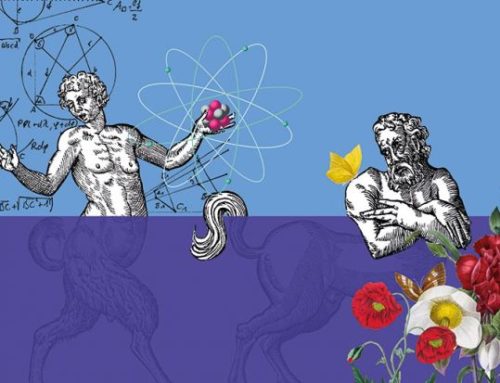Last June, the Project Q team travelled to Ann Arbor Michigan to talk with Professor Alexander Wendt from Ohio State University about his bold new book ‘Quantum Mind and Social Science’. The team produced a short video interview as well a short exegesis of the book by Wendt. The final presentation, an animated video lecture by Wendt, encourages us to venture out of our disciplinary silos to consider the importance of quantum physics for the social sciences.
Watch the video below for the final version of Alexander Wendt’s animated video lecture on ‘Quantum Mind and Social Science’.







[…] N. George (California State University, Long Beach), Jairus V. Grove (University of Hawaii, Manoa), Alexander Wendt (Ohio State University), Colin Wight (University of Sydney), Shohini Ghose (Wilfrid Laurier […]
A friend of mine who attended the ISA in Atlanta just sent me this link because of my eclectic non-traditional views on sovereignty and influence in the world. I have a BS in applied physics, MA in aeronautical sciences and MA in resourcing national strategy. While at the Eisenhower school, I developed a Model of Power that described the flow of sovereignty (energy) and followed the laws of Thermodynamics. Since most military officers are not physics grads, my model did not gain much traction with my “Political Science Contemporaries” and the other history majors.
I love science, math and logic. I have always believed that “Math is the language that deciphers the science that describes the miracle of life. If you think math is hard, you should try life.”
I have always enjoyed Einstein and I use a basic interpretation of his Theory of Special Relativity to teach leadership. Since there is no cosmic time, no simultaneity and everything is relative, I believe Einstein’s theory is actually very applicable to leaders and building professionalism. Since the only place in time and space that has meaning is “here and now” for an observer, my belief is Einstein believed “we need to make decisions today, to create a future, that we are proud of when it is our past.” I use this line all the time mentoring young officers and to introduce them to beauty of Einstein. Everything we do matters, and how we do what we do matters even more as leaders.
Also, I view strategy as the alignment of effort and energy that follows the natural laws of thermodynamics. Good strategy minimizes turbulence and friction and ultimately generates less heat (or loss of energy) for the entity executing it. To attempt to slow or reduce chaos and bring a semblance of order to our world (minimize the effects of entropy), humans make laws, organize and align their efforts. It all makes perfect sense scientifically.
Additionally, I believe sovereignty also follows the natural laws of thermodynamics. Sovereignty used to be defined by boundaries and borders ruled by a sovereign, but in a globalized world connected by the internet, I find that sovereignty seems to be more individualistic, can be divided into seemingly infinite amounts of packets (like quanta), and these packets of individual sovereignty can be pooled and concentrated in time and space for profound effects around the globe…we see this in our information age…Arab Spring, coups, etc.
I really enjoyed your video and I am fascinated by the idea of your book “quantum mind and social sciences.” Innovation and discovery occur at the nexus of disciplines. I read the book “Max Planck”, and his triumphs and shortcomings have taught me many lessons in inspiring and motivating innovation and creative thought in young leaders.
That Einstein quote is marvelous. I recently wrote a short piece entitled “You are History”. Old Albert there as always not only beat me to it, he did so far more eloquently.
Also completely agree with your assessment of this topic. I read Wendt’s Political Science book and found it immensely readable and persuasive. His latest one has just been ordered, too.
David, if you are speaking of the quotes in my comment above, those are my quotes and simply a distillation of our efforts to use math and science to model observations of life. I am glad you like them, but sometimes I am concerned that my over-simplification of the Theory of Special Relativity for leaders won’t resonate with people — the only place in time and space that matters to an observer or actor is now…so make the most of it. Everything we do matters. I was hoping that Alex Wendt would respond because I have a thought about a theory of “Quantum Sovereignty” that I have been struggling with in our digital age and how people can be mobilized quickly in time and space with the linking of Facts and Feelings over diverse populations. As humans, we are arguably collections of quantum material and at times display quantum qualities. If that is true, you could argue individual sovereignty is actually energy that we, humans, chose to give away, share, pool, collect for survival or some effect in packets, or quanta. If the laws of nature, science, and thermodynamics hold true and are irrefutable, energy can neither be created or destroyed, so there is only so much energy (sovereignty quanta) an individual has and a finite amount in a closed system. So in a digital age, if I or my children are giving our individual loyalty and support (sovereignty quanta) to other people, organizations, movements or political entities, what is left for a post-Westfalian sovereignty or nation-state? If our ties to things other than our country detract from our loyalty to a nation defined by a border, what does that mean? If we are a citizen of everywhere, are we a citizen of nowhere? If we are loyal to many, what is left for those things that once held nations together? Just a thought.